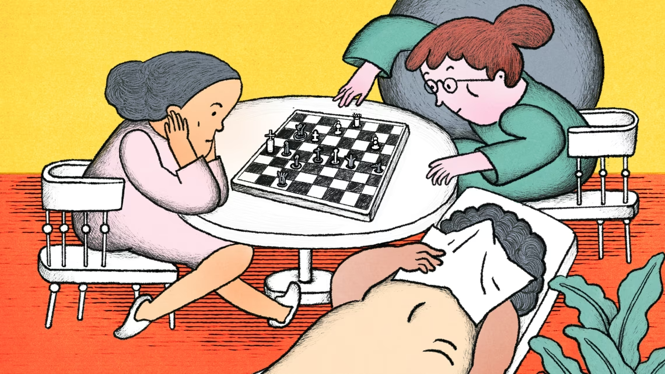This is an edition of The Atlantic Daily, a newsletter that guides you through the biggest stories of the day, helps you discover new ideas, and recommends the best in culture. Sign up for it here.
Health Secretary Robert F. Kennedy Jr. has spent the past six months working fast to embed his Make America Healthy Again creed into American life. Over the summer alone, he has struck deals with some food companies to phase out some petroleum-based food dyes, waged a war against pediatricians over COVID-19 vaccines for young children, seemingly toyed with the idea of shipping fresh food to Americans in “MAHA boxes,” and pledged to reboot the nation’s dietary guidelines from scratch. I spoke with the Atlantic staff writer Nicholas Florko, who reports on health policy, about how the MAHA-fication of the country is coming along.
Stephanie Bai: How would you describe these past few months in MAHA world?
Nicholas Florko: We’ve seen Robert F. Kennedy Jr. take actions that will weaken our vaccination system in the United States, confirming some of public health’s worst fears. But there have also been some surprising successes in his term. RFK Jr. has embraced the role of a dealmaker, and we’ve seen him leaning on food companies in particular to change their offerings and get rid of synthetic dyes. He’s been able to do that simply by asking and by making handshake agreements, as opposed to what we would normally expect from a health secretary—for him to use his regulatory power to force these changes.
Stephanie: Why are these handshake agreements proving successful?
Nicholas: Food companies likely realize that it’s in their best interest to get on the good side of the Trump administration. We see this throughout all sectors of business, but for the food sector, these changes are small enough that companies can make them without dramatically hurting their bottom line, while also earning a lot of brownie points with the administration.
Stephanie: That reminds me of President Donald Trump’s announcement in July that Coca-Cola, famously his favorite drink, had agreed to make their soda with cane sugar rather than high-fructose corn syrup. To what extent is Trump influencing health policy? Does RFK Jr. have a lot of latitude?
Nicholas: The Coca-Cola issue is an interesting one because while it’s true that RFK Jr. is very anti–high-fructose corn syrup, he’s also publicly called sugar a “poison.” So this is one of those instances where you wonder what is behind RFK Jr. supporting this change.
He must know that this isn’t actually going to significantly improve public health, but also probably realizes that this is important to his boss. That being said, I think that RFK Jr. does have some latitude. If you left Trump to his own devices, you probably wouldn’t see the same level of aggression toward food companies overall, unless he had a personal stake in the situation.
Stephanie: With back-to-school season under way, many students are getting up-to-date on their shots. How does this year’s vaccination season compare to years past?
Nicholas: We haven’t seen huge changes, but we are seeing some hints of what might come. Much of the action thus far is around COVID vaccines. In February the president issued a largely symbolic executive order barring schools from enforcing COVID-19 vaccine mandates, but by the time that was issued, virtually no schools actually had such a policy. RFK Jr. also softened the CDC’s recommendation for kids to get the COVID-19 vaccine. That’s probably been one of his most controversial decisions, prompting a high-profile clash with pediatricians; a leading pediatrics group put out its own suggestions saying that children should be getting vaccinated. But we haven’t seen major changes to the other vaccines typically required for returning to school.
Stephanie: That disagreement must make it confusing for parents to know who to listen to.
Nicholas: It’s reasonable to assume that a good portion of people will listen to RFK Jr., but those people may be already skeptical of vaccines and see him as a trustworthy messenger, versus folks who are on the fence. I think that’s really the question: Where do those people who are on the fence go? Do they take RFK Jr.’s suggestion, or do they trust their doctor?
Stephanie: In May, you wrote a story that was alarming for salad lovers, specifically about how bagged lettuce should be avoided. What’s happening with America’s food-safety system?
Nicholas: One of the earliest, most concerning changes for food safety happened when DOGE came into the federal agencies. Advisory committees focused on food-safety questions were shut down. People were being laid off—such as the administrative staff in charge of making sure that inspectors can go out to farms. Some layoffs seem to have been rescinded, but there’s a broad worry about what will happen to the day-to-day operations that we all depend on to keep us safe.
Stephanie: A recent story about the recall of frozen shrimp with potential radioactive contamination has caused a bit of a panic about where America’s food safety is headed. How did you take that news?
Nicholas: One thing that gives me some hope is the fact that this is the sort of thing that we caught, and there have been recalls by Walmart. That’s really the big fear when it comes to food safety: that if we attack these federal programs, they’re not going to be able to actually find the food that might get us sick before a lot of people get sick. So I think this is actually a good sign that things are working relatively well.
Stephanie: Out of all the stories you’ve written this past summer about the MAHA movement, is there one that keeps you up at night? And is there one that makes you feel hopeful for where American health and safety is going?
Nicholas: Honestly, the stories that keep me up at night are by our colleague Katie Wu. Her recent one on RFK Jr.’s COVID revenge campaign has really stuck with me.
My own story that both keeps me up at night and that makes me hopeful is related to states, which are taking up the MAHA charge in a very quick fashion. It’s felt like Republican governors and legislatures are all trying to out-MAHA one another to ingratiate themselves to Trump and to RFK Jr.
Some of these ideas are good from a public-health perspective, but these states are doing a lot of things really fast, which is what worries me. For example, some states are blocking people from using food stamps to buy soda and other junk food. There’s a question of how that policy will be implemented, how the attempts to enact these restrictions could affect the entire food-stamp system. Other states have passed laws banning artificial dyes in their school meals. Again, it’s one of those ideas that’s a good step, but the devil is in the details of how it’s executed. How does this flurry of activity in the states actually affect people in the coming months? Does this ultimately make America healthier, or does it send our food system into chaos?
Related:
Here are three new stories from The Atlantic:
- “Make McCarthy great again.”
- COVID revisionism has gone too far.
- What Trump actually wants from a Ukraine deal
Today’s News
- A New York appeals court voided the roughly $500 million civil-fraud penalty against President Donald Trump, calling it “excessive,” but upheld the finding that Trump and his company committed long-running business fraud. Business restrictions on Trump in New York remain, and the state plans to appeal.
- More immigrants are leaving the U.S. than arriving, according to the Pew Research Center. The shift, affected by Trump’s strict immigration policies, is the first of its kind since the 1960s.
- California lawmakers passed the first of three bills on a redistricting plan backed by Governor Gavin Newsom that would shift as many as five Republican-held U.S. House seats toward Democrats ahead of the 2026 midterms. The move comes a day after Texas state House Republicans passed a new congressional map that could add five U.S. House seats for the GOP.
Evening Read

What We Gain When We Stop Caring
By Anna Holmes
Sometime in the early aughts, the comedian Amy Poehler made a vulgar joke while sitting in the Saturday Night Live writers’ room waiting for a midweek read-through to begin. As detailed in Tina Fey’s 2011 memoir, Bossypants, Jimmy Fallon, who was also in the show’s cast at the time, jokingly recoiled and told Poehler to stop it.
“It’s not cute!” Fallon exclaimed. “I don’t like it.”
“Amy dropped what she was doing, went black in the eyes for a second, and wheeled around on him,” Fey writes. “‘I don’t fucking care if you like it.’”
More From The Atlantic
- Alexandra Petri: Donald Trump’s guide to museums
- What Trump doesn’t understand about “America First”
- Trump has no (legal) power to mess with the election.
- The AI doomers are getting doomier.
- Radio Atlantic: Peace in Ukraine is not a real-estate deal.
- Five Baha’i lessons for a happier life
Culture Break

Read. In 2022, The Atlantic’s Culture writers recommended the books that they read too late—but that you should read now.
Take a look. This is how the 17th-century painter Rachel Ruysch became one of the greatest still-life painters in the history of art, Zachary Fine writes.
Rafaela Jinich contributed to this newsletter.
Explore all of our newsletters here.
When you buy a book using a link in this newsletter, we receive a commission. Thank you for supporting The Atlantic.
The post A MAHA Progress Report appeared first on The Atlantic.



